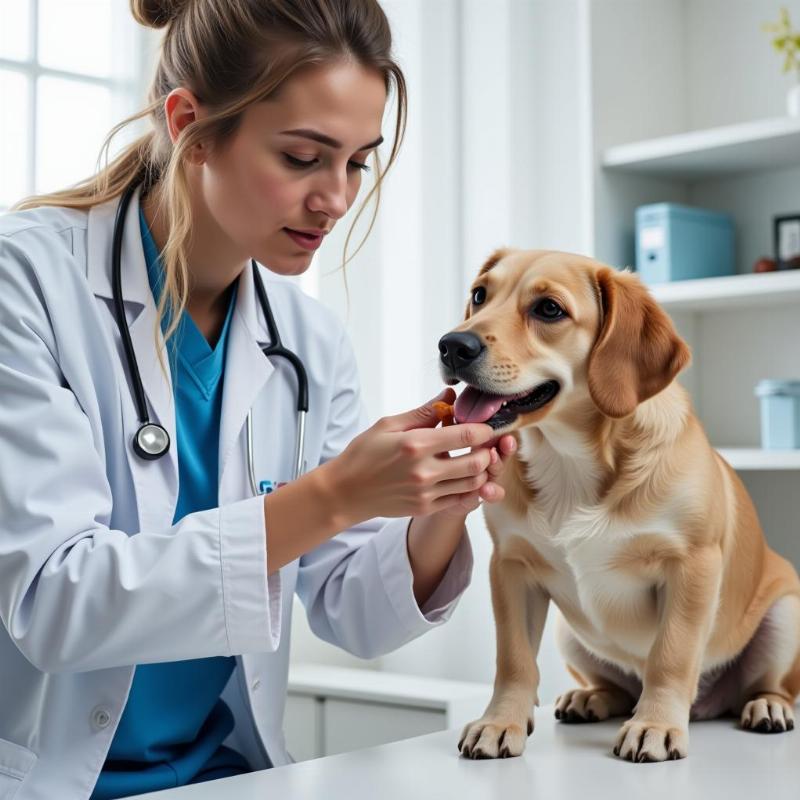Courage the Cowardly Dog, the beloved cartoon character, may be a humorous exaggeration of canine anxiety, but fear and nervousness are real issues for many dogs in the USA. Understanding the root causes of these anxieties and implementing appropriate strategies can significantly improve your dog’s quality of life. From separation anxiety to fear of loud noises, Beautdogs.us is here to guide you through helping your courageous companion conquer their fears.
Identifying Anxiety in Your Dog
Just like humans, dogs exhibit anxiety in different ways. Some common signs include excessive barking, destructive behavior (like chewing furniture), panting, pacing, whining, trembling, and even changes in appetite or elimination habits. Recognizing these signs is the first step toward addressing your dog’s anxiety. Is your dog constantly hiding when guests arrive? Does the sound of thunder send them scurrying under the bed? These behaviors might indicate an underlying anxiety that needs attention.
Common Causes of Canine Anxiety
Several factors can contribute to anxiety in dogs. Genetics plays a role; some breeds are predisposed to anxiety. Past experiences, such as trauma or abuse, can also significantly impact a dog’s emotional well-being. Changes in routine, like moving to a new home or the addition of a new family member, can be unsettling for dogs. Even lack of proper socialization during puppyhood can lead to anxiety later in life.
Effective Strategies for Managing Canine Anxiety
Addressing canine anxiety often requires a multifaceted approach. Creating a safe and predictable environment for your dog is crucial. This includes providing a comfortable den-like space where they can retreat when feeling overwhelmed. Consistent routines, including regular feeding times and walks, can offer a sense of stability. Positive reinforcement training, focusing on rewarding calm behavior, is essential. Consult with a certified professional dog trainer who can guide you through positive reinforcement methods.
The Importance of Veterinary Guidance
Never underestimate the importance of consulting with a veterinarian. They can rule out any underlying medical conditions that might be contributing to your dog’s anxiety. Your veterinarian can also recommend behavior modification techniques and, if necessary, prescribe medications to help manage severe anxiety.
 Veterinary Checkup for Anxious Dog
Veterinary Checkup for Anxious Dog
Creating a Calm and Enriching Environment
Enrichment plays a vital role in reducing anxiety. Providing plenty of mental and physical stimulation can help channel your dog’s nervous energy in positive ways. Puzzle toys, interactive games, and regular exercise can significantly reduce anxiety levels. Consider activities like agility training or scent work, which engage both mind and body.
Building Confidence Through Positive Reinforcement
Positive reinforcement training is the cornerstone of managing anxiety. Rewarding your dog for calm behavior helps them associate positive experiences with situations that typically trigger anxiety. Start by exposing your dog to the anxiety-inducing stimulus at a low intensity and gradually increase the exposure while rewarding calm responses. Patience and consistency are key to success.
Conclusion
Just like Courage, the cartoon dog, many of our real-life furry friends struggle with anxiety. By understanding the causes and implementing effective strategies like creating a secure environment, consulting a veterinarian, providing enrichment, and utilizing positive reinforcement training, you can help your dog overcome their fears and live a happier, more confident life. Remember, Beautdogs.us is here to support you and your courageous companion on this journey.
FAQ
- How can I tell if my dog is anxious? Signs of anxiety can include excessive barking, destructive behavior, panting, pacing, trembling, and changes in appetite or elimination habits.
- What are the common causes of canine anxiety? Genetics, past experiences, changes in routine, and lack of socialization can all contribute to anxiety.
- Should I take my anxious dog to the vet? Yes, a veterinarian can rule out underlying medical conditions and recommend appropriate treatment options.
- What are some effective ways to manage dog anxiety? Creating a safe environment, positive reinforcement training, enrichment activities, and, if necessary, medication can help manage anxiety.
- How can I help my dog overcome its fear of thunderstorms? Create a safe space for your dog during thunderstorms, use desensitization techniques, and provide positive reinforcement.
- Is it normal for dogs to experience some level of anxiety? Mild anxiety in certain situations is normal, but excessive or persistent anxiety requires attention.
- Where can I find more information about canine anxiety? Beautdogs.us offers a wealth of resources on canine anxiety and other dog-related topics.
Beautdogs.us is your premier online resource for all things dog-related in the USA. We offer expert advice on dog breeds, care, training, and products, catering to both new and experienced dog owners. Our mission is to empower you with the knowledge and resources to provide the best possible care for your beloved canine companion. For any inquiries, feel free to reach out to us via email at [email protected] or call us at +1 501-555-7529. Beautdogs.us – your trusted partner in your dog’s journey.